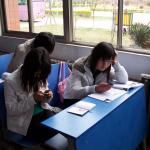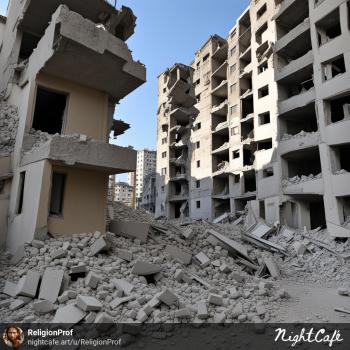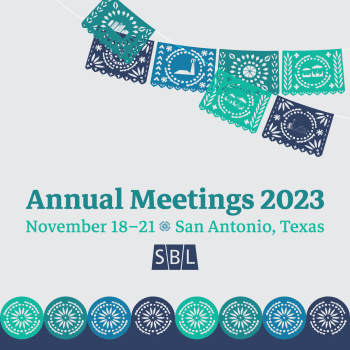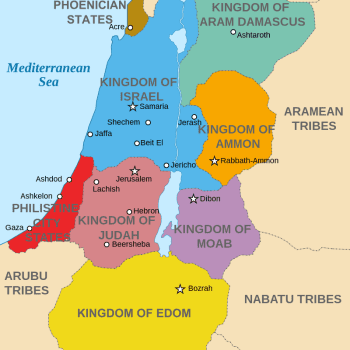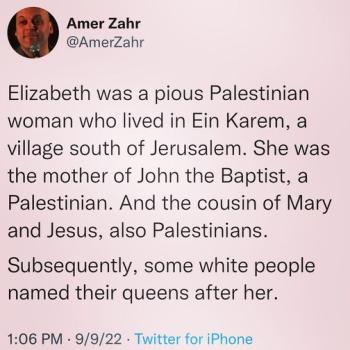I had Israel/Palestine on my mind even before the recent re-escalation of violence between Israel and Gaza. I have a sabbatical coming up the academic year after next and would seriously love to spend the full year devoted to writing my book on John the Baptist. One place I would love to spend at least some of that time is the Jordan river valley and other locations where John is said to have been active. Surprisingly few books have been written about John as a historical figure, at least compared with other topics related to ancient Judaism and early Christianity. I’m not aware that any was written at least partly on the ground in the relevant locales (and of course, consulting historic maps and data to take into account how the damming of the Jordan has impacted the river valley).
I had also been thinking, like many academics, about the return of the possibility of study abroad. I’ve had opportunities to travel with students to a variety of places, but the Holy Land remains the most meaningful both for me personally and professionally, and for the majority of the students I’ve traveled with (which isn’t a slight on Latvia or India, which were also phenomenal and are places to which I would love to return). The conflict that is on the news perennially often scares students (and even more so their parents) off the prospect of traveling to Israel and the occupied territories, even though gun violence in the United States is far scarier and far more deadly. I tried developing an alternative trip to Transylvania, where I have spent a significant amount of time, but there wasn’t the same level of interest. I will probably try again, this time crafting a study abroad trip about the history of religion in Ireland. But I would hate for Israel/Palestine to be off the table altogether indefinitely.
I have received pushback on taking students to Israel from colleagues who support the BDS (Boycott, Divestment, Sanctions) movement as a response to Israel’s policies and actions. A colleague recently forwarded me a petition that is specific to the field of religious studies. I appreciate the sentiment that motivates their stance. As a scholar of ancient literature shaped by this particular region, it would be difficult (although perhaps not impossible) to cut all ties with any work that in some way benefits the Israeli government. My identity as a person of Jewish descent with ancestors of a family name that has pretty much vanished forever as a result of the Holocaust, I am deeply moved to see a nation that is predominantly Jewish flourishing in the historic homeland of the Jewish people. As a Christian, I am aligned with the Christians of the Holy Land who find themselves walled in and prevented from traveling to the sacred sites in their own historic homeland even on the holy days when it would be most meaningful to do so. As a human being concerned for social justice, I am dismayed that occupied territories and their inhabitants are kept in limbo. As a Jew by matrilineal bloodline if not by practice, I appreciate the conundrum that integrating the Palestinian population into a democratic Israel presents to those who want Israel to be a safe place for Jews if nowhere else is. As a human being concerned for social justice and as a religious person, I long for a world in which no people group would be faced with genocide and as a result confronted with the conundrum of playing the rights of others off against the protection of one’s own people and their heritage.
One of the places in the Holy Land that made the biggest impression on me was Hebron. The Tomb of the Patriarchs is a mosque on one side and a synagogue on the other. The entrances to the different parts of the building are on different sides of a checkpoint. There are metal detectors thanks to an American-born Israeli Jew named Baruch Goldstein who entered the mosque and shot 29 Muslim worshippers. Today Arabs (including the Christian who was my tour guide when I visited–this isn’t about Islam) can scarcely get onto the Israeli side of the checkpoint, never mind enter the synagogue. I could visit both sides, and see the same sacred tombs through bullet-proof glass from opposite directions. I could be inspired and depressed at the same time by what it means for two groups to share this sacred space, to literally face one another when worshipping, and yet be separated by conflict over land and politics in this way.
But probably the most disturbing thing in Hebron was graffiti that said “Gas the Arabs.” The sentiment of wanting to do unto others to prevent them doing unto you is one that I stand against in all my identities. “Never again,” when understood to mean “let’s do whatever it takes to try to prevent this ever happening again to us,” can be self-defeating. It is crucial that it be understood that never again will I stand by, much less support, when something like what happened to my own people happens to anyone.
The reason I cannot support BDS is that I have seen the impact on American students of taking them to this part of the world. I have seen Palestinian-Americans have their perspective transformed by visiting not only the places from which their families were driven out, but also the Holocaust museum. I have seen American Jews and Christians affected by visiting Bethlehem and seeing how it has been walled in. I may be wrong, but I think the effort to get people in the United States to understand what is happening in the Holy Land is likely to bear more positive fruit in the long run than depriving the Israeli government of whatever fraction of the cost of our visit ends up in its coffers. Especially when the taxes that I pay to my own government arguably do as much harm if not more.
What’s your take on this topic? Do share your experiences if you’ve been to Israel, the West Bank, and/or Gaza. Please also share your thoughts on this difficult conundrum that faces populations in the Holy Land but which has an impact on the entire world.
Elsewhere in the blogosphere and news on this subject:
From Sojourners: “For Lasting Peace, U.S. Must Stop Enabling Israeli Occupation of Palestine”
There is a conference in Israel with a call for papers focused on the teaching of Hebrew
There is also a call for submissions about Christian theologies of Jews and Judaism
Colleges Grapple With Resuming Study Abroad
John Pavlovitz wrote, “Here’s What I Know About Israel and Palestine”
Mike Pence blamed Joe Biden for the conflict in Israel
GOP senators called for a resolution supporting Israel
Biden backs a cease fire, but Netanyahu has rejected Biden’s call for de-escalation, with members of his own party accusing him of provoking and prolonging the conflict to prevent opponents from forming a government
Bernie Sanders has called for a cessation of arms sales to Israel
Each Person is the Entire World
Israeli journalist: It’s a shame rocket didn’t kill ‘masses’ of Arabs
Israel and Immigration: A Christian Reflection on the Consequences of Past Sins
Speaking of other places you can travel with a professor related to biblical studies:
https://ehrmanblog.org/wanna-go-to-northern-italy-with-me-in-september/?utm_source=rss&utm_medium=rss&utm_campaign=wanna-go-to-northern-italy-with-me-in-september
Just had drawn to my attention that this is on YouTube:



